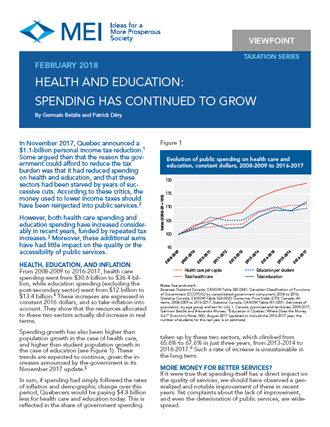Health care and education: It’s not about the money

Montreal, February 7, 2018 – Contrary to what some would have you believe, spending on health care and education in Quebec have increased substantially in recent years, but these additional sums have had little impact on the quality or accessibility of public services, shows a publication launched today by the MEI.
“It is not true that the health care and education budgets have been slashed,” notes Germain Belzile, Senior Associate Researcher at the MEI and co-author of the publication. “Not only has spending gone up considerably, but it has grown more quickly than either the general population or the student population.”
Indeed, from 2008-2009 to 2016-2017, health care spending went from $30.6 billion to $36.4 billion, while education spending (excluding the post-secondary sector) went from $12 billion to $13.4 billion. These increases take inflation into account, which shows that the resources allocated to these two sectors did go up in real terms.
“With this kind of spending, we might expect to have seen a general improvement in public services. But this is not what we observe,” adds Mr. Belzile. “Performance does not depend on how many billions are spent, and the injection of additional funds would just be an immense waste.”
Moreover, a recent poll commissioned by the MEI shows that 71% of Quebecers believe that the additional amounts injected over the past 10 years in health and education have not yielded results.
If spending had simply followed the rates of inflation and demographic change over this period, Quebecers would be paying $4.8 billion less for health care and education today.
“It’s unequivocal. Even though many commentators have demanded that the money used to lower income taxes be reinjected into public services, it is their organization, their management, and their performance that are at issue, much more than their funding,” insists Patrick Déry, Public Policy Analyst at the MEI and co-author of the publication.
The U.S. health care system is a striking example of the fact that performance does not depend on the amount of money spent: It is by far the most expensive in the world, but it is regularly ranked last in comparisons of industrialized countries.
“Before injecting additional resources, the Quebec government should re-examine the way it delivers public services; otherwise, there is no reason to believe that it will obtain different results,” concludes Mr. Déry.
The Viewpoint entitled “Health and Education: Spending Has Continued to Grow” was prepared by Germain Belzile, Senior Associate Researcher at the MEI, and Patrick Déry, Public Policy Analyst at the MEI. This publication is available on our website.
* * *
The Montreal Economic Institute is an independent, non-partisan, not-for-profit research and educational organization. Through its studies and its conferences, the MEI stimulates debate on public policies in Quebec and across Canada by proposing wealth-creating reforms based on market mechanisms.
– 30 –
Interview requests: Pascale Déry, Vice President, Communications and Development, MEI / Tel.: 514-273-0969 ext. 2233 / Cell.: 514-502-6757 / Email: pdery@iedm.org

